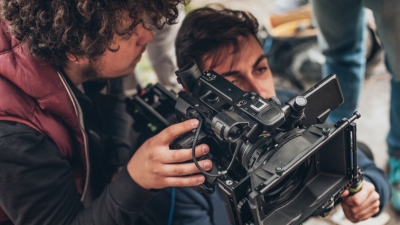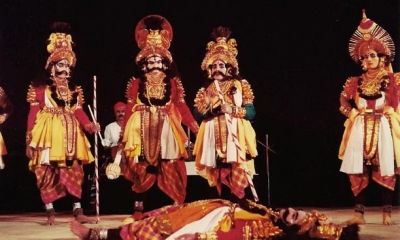
A director’s role
The director translates a script creatively, decides the cast, costumes, venue of shoot and chooses technicians and producers to help the director manage the entire production by looking into the operational aspects that include hiring technicians, managing locations, arranging camera rentals and so on.
According to Chowdhury, the first thing one requires to become a director is a knack for films. “You need to watch a lot of films. I started watching Hindi and Bengali cinema and then moved onto foreign films,” he says.
It is equally important to acquire knowledge of all the aspects of film making. A director has to be involved in each and every process from scripting and dialogue writing to editing. “One should be able to close one’s eyes and visualize the entire film,” says Chowdhury.
Good communication and planning skills will help in conveying thoughts and ideas clearly to the entire crew and get work done on time.
What to study?
Film making is taught as part of mass media at an undergraduate level. You can opt for special courses offered by film schools for further specializations.
Where:
Film and Television Institute of India, Pune: Three year post graduate diploma in Direction and Screenplay Writing.
Jamia Millia Islamia, Delhi: Master of Arts in Mass Communication.
Satyaji Ray Film and Televiison Institute, Kolkata: Three year post graduate programme in Cinema.
Xavier Institute of Communications, Mumbai: Diploma in Film, Television and Digital Video Production.
Challenges
Film-making is a labourious art form, requiring a lot of hard work and discipline. “Making a film is not as simple as it looks. There are many variables at play.” says Chowdhury. “A director has to juggle all of them.”
One should be able to make last-minute changes and at the same time stick to the budget. “Sometimes while shooting it may suddenly rain and you will have to change the location or reschedule the shoot. This can cost a lot and budgeting and planning skills are important,” he adds.
Another challenge is co-ordination and understanding of people. A director has to handle actors, (which can be a tough job) hone their skills and abilities the way it’s needed in the film. This requires an understanding of people and how to motivate them to give their best.
One should be willing to constantly learn and relearn everything they know. “You are always learning. You have to stay abreast of new technology and the latest in cinema and film-making,” adds Chowdhury.
Director’s speak
Aniruddha Roy Chowdhury fell in love with cinema when he watched his first film Haathi Mere Saathi, in a quaint single-screen cinema hall at the age of 10. But it took him a long time for his dream to be fulfilled. To begin with, Chowdhury, who directed Pink, had no idead how to get started in the industry. Coming from a middle-class background, Chowdhury was the first one in his family to venture into films. “There was no one to advise me or guide me. So I used to hang around at Tollygunge Studio in Kolkata daily to see what was happening there. At that time it was the only way I could get a peek into film-making,” says Chowdhury, quickly adding that he wouldn’t recommend this to others. Slowly, he began helping out on the sets and later took on full-time work as a film-executive at a private studio. “I slogged it out at the studio for five to six years. There was very little money, but I made it a point to familiarize myself with every aspect of film production, which is essential if you want to become a director,” adds Chowdhury.
With some experience under his belt, he moved onto making telefilms for Doordarshan, and there was no looking back after that. “I got to travel a lot and became involved in the film-making process and I realised that I have stories that I want to share with people (through films),” he adds.
Picture Credit : Google



